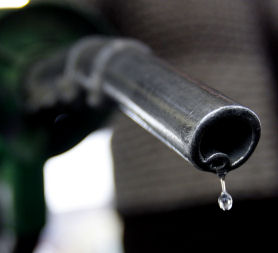Petrol prices at an all time high
The rising cost of oil, along with fuel duty and VAT increases, sees the price of petrol rise to £6 a gallon.

Figures released by the AA show the cost of unleaded petrol has gone up by nearly seven pence since the start of the year, and 1.68p in the past week. That’s taken the price of unleaded petrol to 132.12p a litre while the average diesel cost has also hit a new record at 137.92p.
A year ago, a litre of petrol on average cost 114.30p a litre and diesel was 115.31p. For a family with two petrol cars, the cost of fuel has risen from 242.70p a month in March 2010 to 280.54p now.
In the same period, the price of oil has risen from around $85 a barrel to $113 US dollars in the wake of political unrest in north Africa and the Middle East.
One of the most expensive places to buy petrol is in Benson in Kent, with one station charging 143.9p for an unleaded litre. Some areas in the south, especially in rural areas, charge upto 15% more for petrol than in the north.
One of the cheapest places in the country for petrol is in Bradford, with one garage on Cowley Crescent selling a litre for 125.90p a litre. Some filling stations in Wakefield, Glasgow, and Hull are also charging 125.9p for a litre of unleaded, with the cheapest petrol in Liverpool and Manchester costing slightly more.
These high prices are already leaving casualties among drivers, consumers and business. Edmund King, AA president
AA president Edmund King said: “£6 a gallon is not just another milestone along the road to higher fuel prices; it marks the point at which the wheels start to come off mobility in 21st century UK.”
“Lower-income drivers, poorer rural residents, volunteer drivers, youngsters looking to their first jobs are some of the vulnerable groups struggling to stay on the road.”
He went on: “Over the past two years, the AA has warned that unbridled speculation in the oil markets and a constant drip of fuel tax rises would haemorrhage family finances to the point that it would damage the local and wider economy.
“Middle East troubles have brought matters to a head, but the writing’s been on the wall for months and only now are the Government and business analysts taking notice.
“The Government must act urgently to reduce the burden of high fuel duty and VAT. In the meantime, drivers are going to have to manage as best as they can, by cutting out journeys, driving more economically and hoping that a stronger pound will cushion some of the blow.
“But these high prices are already leaving casualties among drivers, consumers and business.”
Chancellor George Osborne has indicated he’s planning to suspend the previous Government’s fuel duty increase of 1p a litre, due in April.
However he remains under pressure to go further in his Budget statement this month and introduce a stabiliser mechanism that would raise and lower petrol taxes according to oil prices.
He may ease duty levels as oil prices increase further, although tax raised from fuel provides the government with a key source of revenue to cut the budget deficit.
Some analysts say a fuel stabiliser would be unworkable. The Chancellor’s coalition partner Business Secretary Vince Cable has warned that implementing a stabiliser would pose “real technical difficulties.”
Last week the campaign group Fair Fuel UK handed a petition with 120 000 signatures to Downing street calling for “fairer fuel taxation,” namely to scrap the 1p rise in fuel duty. Campaigners claim the fuel duty changes could represent an increase of as much as 5p per litre.
The cost of oil is also affecting airlines, with Qantas the latest international company to announce it’s to raise it’s fuel surcharge by upto 40%, the second time it’s raised it’s charges this month. The airline say ticket prices will increase by around 5% as a result.